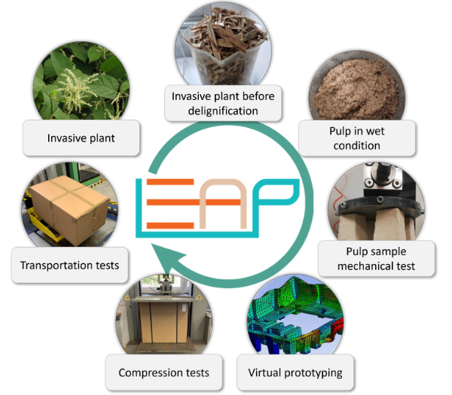
The LEAP Project

About this good practice
The LEAP project tackles the issue of finding a sustainable alternative to EPS (expanded polystyrene) packaging, which is challenging to replace due to its lightweight and protective properties during transport. The only viable alternative, honeycomb packaging, faced limitations with only 5 producers in Europe (high prices and limited availability).
First, Gorenje started with the Sustainable package transition project which then led further, to development of the LEAP project, which focuses on developing sustainable industrial packaging using alternative lignocellulosic biomass. It aims to reduce environmental impact by utilizing invasive plants for raw materials.
Process stages are collection of invasive plants, converting plant biomass into pulp, creating innovative and functional packaging solutions, conducting mechanical and environmental tests to ensure product quality and lastly performing LCA to assess and minimize environmental footprint.
Those that benefit from the project are the environment (reduced pollution and waste; less invasive plants that reduce biodiversity); businesses (access to sustainable, cost-effective packaging solutions); consumers (availability of eco-friendly packaging options); local communities (economic benefits from biomass harvesting and processing activities).
The project was funded by Ministry of Cohesion and Regional development. Partners: Faculty of mechanical engineering, Pulp and paper institute, Gorenje, Surovina, Sintef.
Resources needed
The entire Sustainable package transition project, part of which is also the LEAP Project, cost about 650.000 €.
Approximately 100 full-time equivalent (FTE) staff were required to manage the project.
Evidence of success
Development of protective packaging made of lignocellulosic plant fibers represents an alternative to EPS p. even for heavier products. The project contributes to the implementation of Directive (EU) 2019/904. The transition from EPS to bio-cellulose packaging will have a direct impact on the reduction of CO2 emissions.
As the project is quite newly developed, there are not many quantitative data yet, but it significantly reduced the amount of single use and virgin plastic in Gorenje company.
Potential for learning or transfer
The LEAP project inspires public authorities by showcasing a practical, sustainable alternative to EPS packaging using invasive plant biomass. This approach addresses critical environmental challenges by reducing pollution and supporting biodiversity while offering a feasible pathway for sustainable industrial packaging. The project’s collaborative model, involving industry, academia, and public funding, highlights the power of partnerships to drive impactful change. LEAP demonstrates how public policies can support circular economies and local benefits, such as job creation in biomass processing. Its success can guide policymakers to back similar innovations, reinforcing policies that prioritize sustainability and regional economic development.
Further information
Good practice owner
You can contact the good practice owner below for more detailed information.
